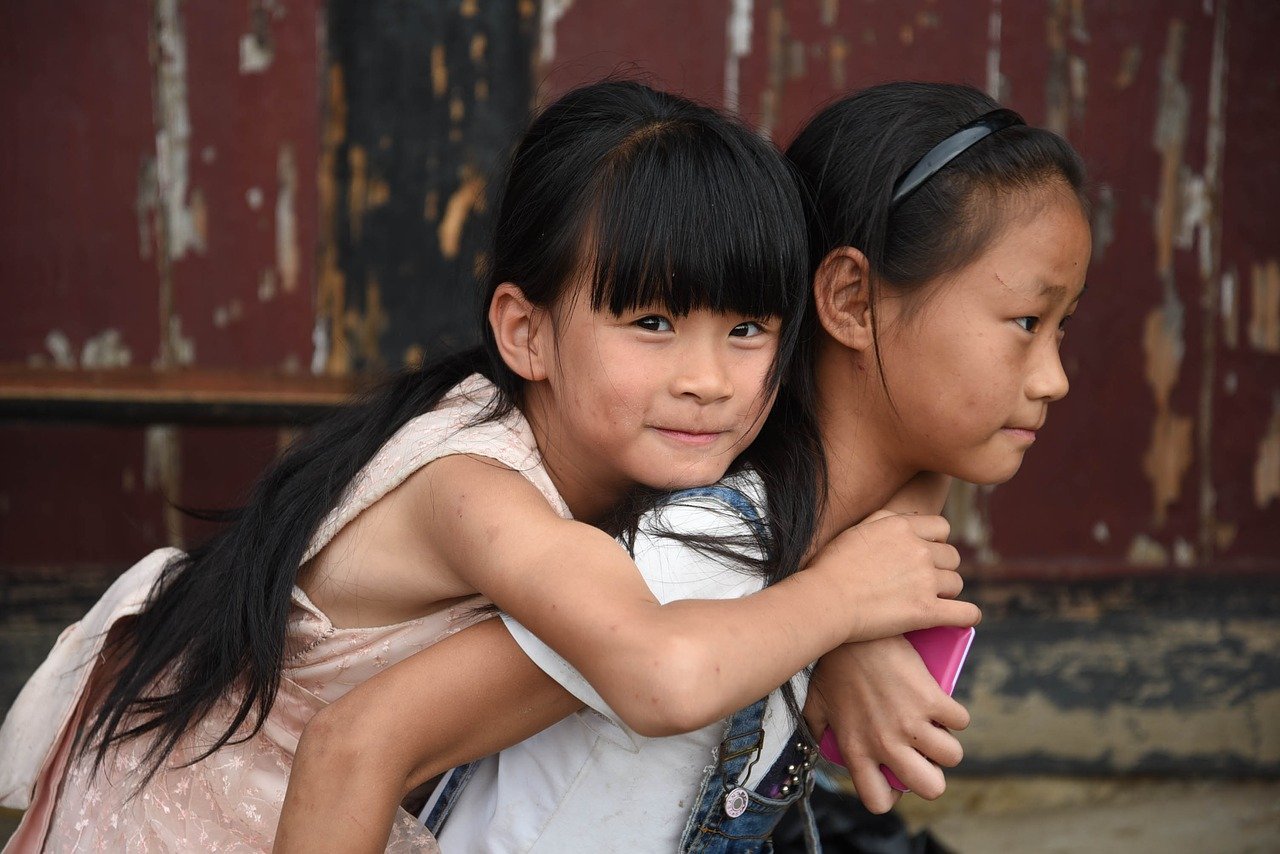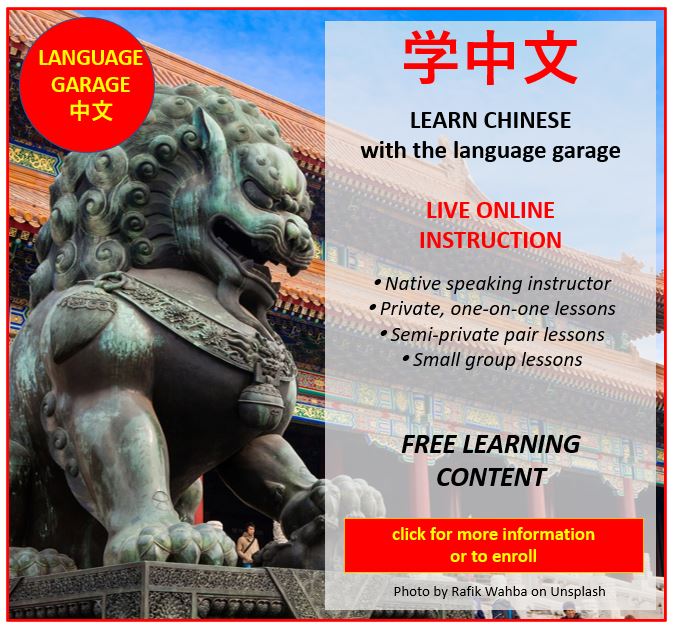Chinese Family Terms: 家庭 jiā tíng
In this post, we’ll learn Chinese family terms so that you can talk about your 家庭 jiā tíng: family. You’ll see that Chinese family vocabulary is pretty specific in many cases when it comes to how old a relative is in relation to you, or whether a relative is on your maternal side or your paternal side.
你家人口多吗? Nǐ jiā rén kǒu duō ma? Do you have a big family?
First, let’s build your Chinese vocabulary by starting with some basic Chinese family terms: 妈妈 mā ma mother; 爸爸 bà ba father; 哥哥 gē ge older brother;弟弟 dì di younger brother; 姐姐 jiě jie older sister; 妹妹 mèi mei younger sister; 女儿 nǚ ér daughter; 儿子 ér zi son, 父母 fù mǔ parents; 孩子 hái zi children. Notice that you specify whether your brother or sister is older or younger than you. If the age of the sibling is not known or unimportant, you can use 兄弟 xiōng dì for brother and 姐妹 jiě mèi for sister.
- 我们家人口 众多/较少。
Wǒmen jiā rén kǒu zhòng duō / jiào shǎo.
I have a big/small family. - 我妈妈是医生。我爸爸是老师。
Wǒ mā ma shì yī shēng . Wǒ bà ba shì lǎo shī.
My mother is a doctor. My father is a teacher.
- 你有兄弟姐妹吗?
Nǐ yǒu xiōng dì jiě mèi ma?
Do you have brothers or sisters? - 我有一个姐姐和一个弟弟。
Wǒ yǒu yī gè jiě jie hé yī gè dì di.
I have one older sister and one younger brother. - 我有三个兄弟。
Wǒ yǒu sān gè xiōng dì.
I have three brothers. - 我有两个姐妹。
Wǒ yǒu liǎng gè jiě mèi.
I have two sisters. - 我是独生子。
Wǒ shì dú shēng zǐ.
I am an only child. - 你有孩子吗?
Nǐ yǒu hái zi ma?
Do you have any children? - 我们有一个儿子和一个女儿。
Wǒ men yǒu yī gè ér zi hé yī gè nǚ ér.
We have a son and a daughter. - 在你家里,谁年龄最大/最小?
Zài nǐ jiā lǐ, shuí nián líng zuì dà / zuì xiǎo?
Who is the oldest/youngest in your family?
这是我姑姑。 Zhè shì wǒ gū gu. This is my aunt.
Now let’s build your Chinese vocabulary by looking at some extended Chinese family terms. First you should know that when you talk about your 亲戚 qīn qi relatives in Chinese, it often matters whether you’re talking about paternal relatives or maternal relatives.
Chinese Vocabulary for Relatives on Your Father’s and Mother’s Side
For example, for relatives on your father’s side: 祖父母 zǔ fù mǔ paternal grandparents; 奶奶 nǎi nai paternal grandmother; 爷爷 yé yepaternal grandfather; 孙子 sūn zi grandson; 孙女 sūn nü granddaughter; 姑姑 gū gu paternal aunt; 伯父 bó fù paternal uncle, older than your father; 叔叔 shū shu paternal uncle, younger than your father.
For relatives on your mother’s side: 外祖父母 wài zǔ fù mǔ maternal grandparents; 外婆 wài pó maternal grandmother; 外公 wài gōng maternal grandfather; 外孙 wài sūn grandson; 外孙女 wài sūn nü granddaughter; 姨妈 yí mā maternal aunt; 舅父 jiù fùmaternal uncle.
Nieces, Nephews, and Cousins
Second, keep in mind that when you’re talking about nieces and nephews, it matters whether they’re your sister’s children or your brother’s children. Through your brother, you have: 侄女 zhí nü niece; 侄子 zhí zi nephew. And through your sister, you have: 外甥女 wài sheng nǚ niece; 外甥 wài sheng nephew.
Finally, things get trickier when you want to talk about cousins in Chinese. For male cousins, you have: 堂兄 táng xiōng (a son of your father’s brother, who is older than you), 堂弟 táng dì (a son of your father’s brother, who is younger than you), 表哥 biǎo gē (a son of your father’s sister or of mother’s brother or sister, who is older than you), and 表弟 biǎo dì (a son of your father’s sister or of mother’s brother or sister, who is younger than you).
To talk about female cousins, you have: 堂姐 táng jiě (a daughter of your father’s sister, who is older than you), 堂妹 táng mèi (a daughter of your father’s sister, who is younger than you), 表姐 biǎo jiě (a daughter of father’s sister or of your mother’s brother or sister, who is older than you), and 表妹 biǎo mèi (a daughter of your father’s sister or of your mother’s brother or sister, who is younger than you).
Let’s see some examples of these Chinese family terms.
- 你多久和亲戚见一次?
Nǐ duō jiǔ hé qīn qi jiàn yī cì?
How often do you see your relatives? - 你的祖父母住在哪里?
Nǐ de zǔ fù mǔ zhù zài nǎ lǐ?
Where do you grandparents live? - 我的奶奶还在工作,但我的爷爷退休了。
Wǒ de nǎi nai huán zài gōng zuò, dàn wǒ de yé ye tuì xiū le.
My grandmother is still working, but my grandfather is retired. - 我们有一个孙子和两个孙女。
Wǒ men yǒu yī gè sūn zi hé liǎng gè sūn nü.
We have three grandchildren: one grandson and two granddaughters. - 我的姑姑和叔叔住在我家附近。
Wǒ de gū gu hé shū shu zhù zài wǒ jiā fù jìn.
My aunt and uncle live near our house. - 我有很多堂表兄弟姐妹。
Wǒ yǒu hěn duō táng biǎo xiōng dì jiě mèi.
I have a lot of cousins. - 我侄女刚上大学。
Wǒ zhí nü gāng shàng dà xué.
My niece just started university. - 我有四个侄子。
Wǒ yǒu sì gè zhí zi.
I have four nephews.
Chinese Vocabulary Related to Marriage
Now let’s learn some Chinese vocabulary related to marriage. Some key vocabulary to know is: 妻子 qī zǐ wife; 丈夫 zhàng fu husband; 结婚 jié hūn to get married; 离婚lí hūn to get divorced; 单身 dān shēn single; 未婚 wèi hūn unmarried. Let’s see some examples.
- 你结婚了还是单身?
Nǐ jié hūn le huán shì dān shēn?
Are you married or single? - 你的太太/先生做什么工作?
Nǐ de tài tai / xiān sheng zuò shén me gōng zuò?
What does your wife/husband do for a living? - 你什么时候结婚的?
Nǐ shén me shí hou jié hūn de?
When did you get married? - 我们结婚二十年了。我们的结婚纪念日是这个周末。
Wǒ men jié hūn èr shí nián le. Wǒ men de jié hūn jì niàn rì shì zhè gè zhōu mò.
We’ve been married for twenty years. Our wedding anniversary is this weekend. - 我妻子怀孕了。两个月后,我们的孩子就要出生了。
Wǒ qī zǐ huái yùn le. Liǎng gè yuè hòu, wǒ men de hái zi jiù yào chū shēng le.
My wife is pregnant. We’re having a baby in two months. - 我父母离婚了。
Wǒ fù mǔ lí hūn le.
My parents are divorced.
我们有了一个孩子。 Wǒ men yǒu le yī gè hái zi. We have a baby.
Finally, let’s learn some Chinese vocabulary to talk about things related to families: 男朋友nán péng you boyfriend; 女朋友 nǚ péng you girlfriend; 婴儿yīng ér baby; 怀孕 huái yùn pregnant; 领养 lǐng yǎng to adopt; 出生 chū shēng to be born;去世 qù shì dead; 在世 zài shì alive; 继父 jì fù stepfather; 继母 jì mǔ stepmother; 继子 jì zǐ stepson; 继女 jì nǚ stepdaughter.
- 你的男朋友/女朋友叫什么名字?
Nǐ de nán péng you / nǚ péng you jiào shén me míng zi?
What is your boyfriend’s/girlfriend’s name? - 我们打算收养一个孩子。
Wǒ men dǎ suàn shōu yǎng yī gè hái zi.
We’re going to adopt a child. - 你的儿子/女儿是什么时候出生的?
Nǐ de ér zi / nǚ ér shì shén me shí hou chū shēng de?
When was your son/daughter born? - 我是被收养的。
Wǒ shì bèi shōu yǎng de.
I was adopted. - 我的奶奶还在世,但我的祖父已经去世了。
Wǒ de nǎi nai huán zài shì, dàn wǒ de yéye yǐ jīng qù shì le.
My grandmother is alive, but my grandfather is dead. - 我和继父/继母关系很好。
Wǒ hé jì fù / jì mǔ guān xi hěn hǎo.
I have a good relationship with my stepfather/stepmother. - 我们和继女/继子住在一起。
Wǒ men hé jì nǚ / jì zǐ zhù zài yī qǐ.
My stepdaughter/stepson lives with us. - 我家有一只狗和一只猫。
Wǒ jiā yǒu yī zhī gǒu hé yī zhī māo.
My family has a dog and a cat.
Do you want to learn Chinese?
We hope you enjoyed learning some Chinese family terms. If you want to learn more, check out our other posts on Chinese language, culture, and more. And if you’re looking for convenient and affordable live Chinese lessons with a real teacher, check out The Language Garage. Our lessons are given online in a virtual classroom, so it doesn’t matter where you live or work – we can come to you. And we have flexible options, with a free trial so that you can decide if there’s a fit. Check us out!






